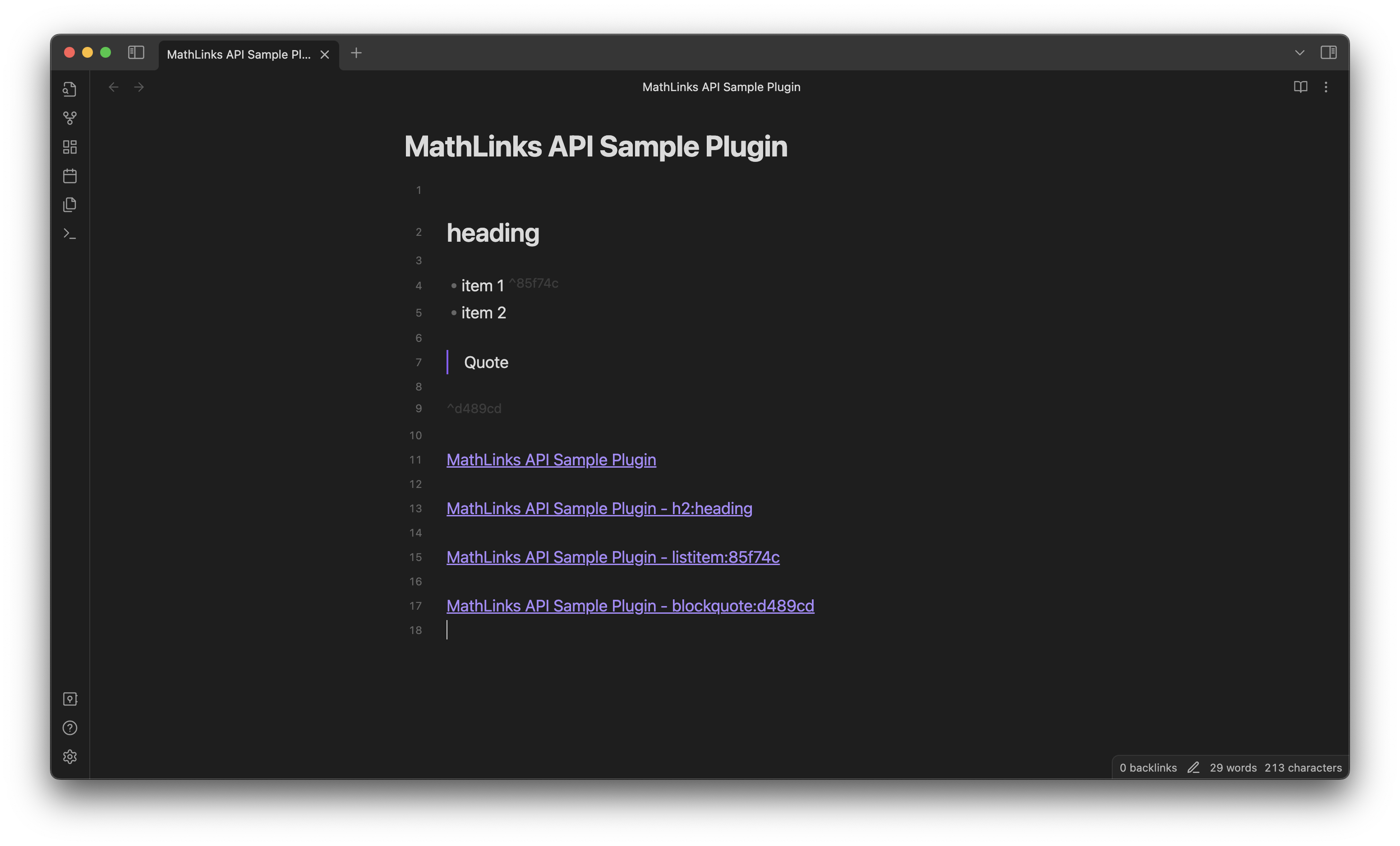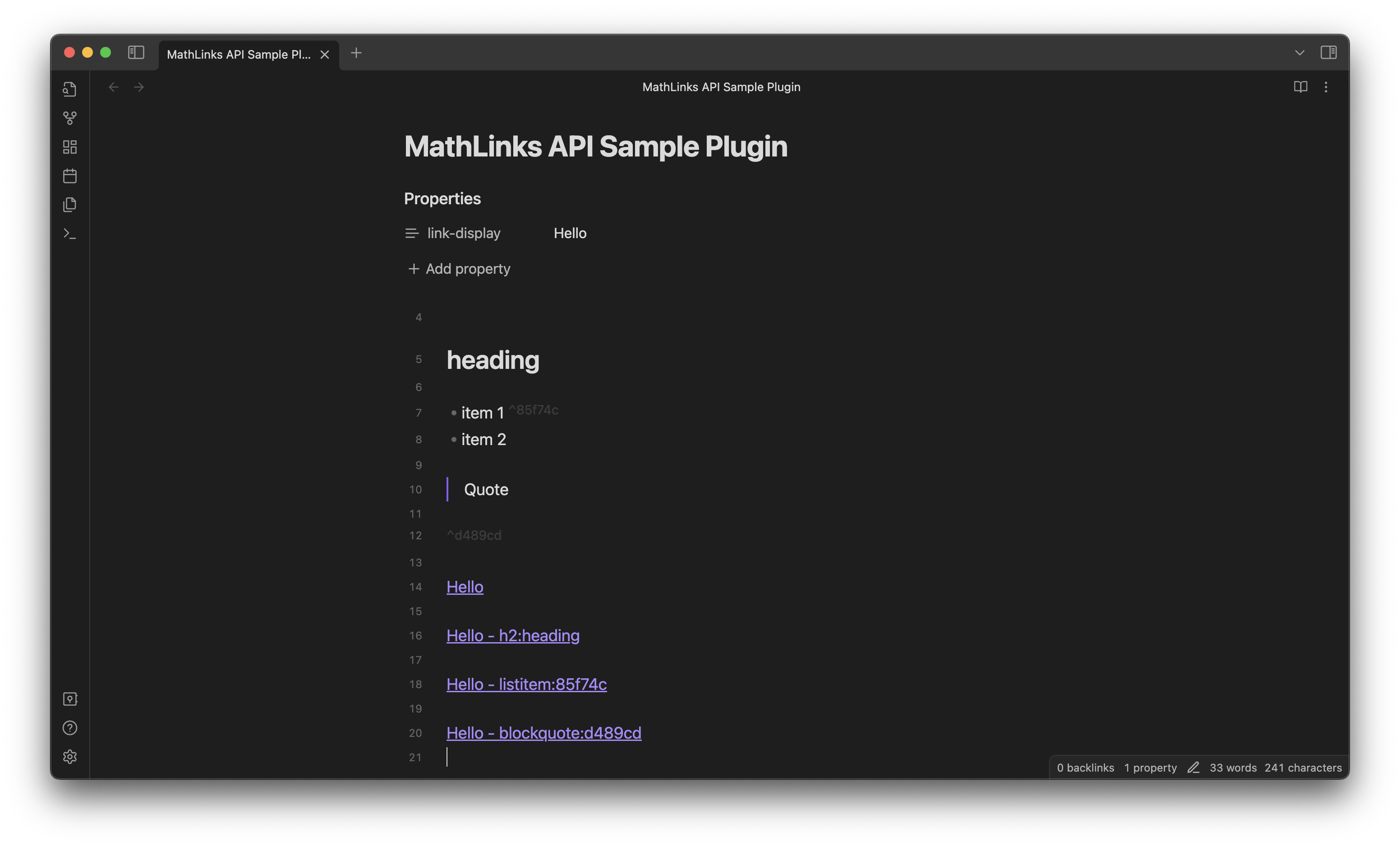This is a sample Obsidian.md plugin for demonstrating the usage of MathLinks API.
MathLinks is a community plugin that renders MathJax in your links. However, its power is not limited to math. Essentially, it can be used to
- change how a link is displayed
- (planned) using arbitrary inline markdown formatting syntaxes supported by Obsidian (see here and here)
- Currently, only inline math is supported, but support for other syntaxes will also come soon.
- without actually touching your note's content (e.g. typing an alias for each link), as well as dynamically update the displayed contents.
MathLinks API is here with you to allow other community plugins to utilize this power! This repository contains a sample plugin that displays a link to a heading/block like this:
Moreover, if the note's property contains a certain key that the user defines in the plugin's setting tab (link-display by default), the note title in the links will be replaced with the corresponding property value:
In this section, I will walk you through the process of building a simple plugin using MathLinks API.
Warning
Make sure that both the npm package obsidian-mathlinks and the Obsidian plugin MathLinks are version 0.5.1 or higher.
$ npm i -D obsidian-mathlinks
Given a pre-processed information of a link, Provider determines how the link is displayed through its provide method.
Let's take a link [[Note#heading]] as an example.
In this case, the "pre-processed information" contains:
parsedLinktext: { path: string, subpath: string }-{ path: 'Note', subpath: '#heading' }targetFile: TFile | null- TFile object forNote.mdif the link pathNoteis successfully resolved,nullotherwisetargetSubpathResult: HeadingSubpathResult | BlockSubpathResult | null- The heading's information given by resolveSubpathsourceFile: TFile- TFile object for the note where this link is stored in
To implement your custom provider, define a subclass of Provider and implement its provide method. It should return
stringthat will be interpreted as a markdown source for the link's displayed text- in the near future, arbitrary inline markdown syntaxes such as
**bold**/$math$will be allowed. But currently, only inline math is supported.
- in the near future, arbitrary inline markdown syntaxes such as
- or
nullwhen your provider doesn't want to provide any custom displayed text.- In other word, your provider will be ignored when returning
null.
- In other word, your provider will be ignored when returning
obsidian-mathlinks-api-sample-plugin/main.ts
Lines 23 to 62 in 983d2fb
In the onload method of your plugin, register your custom provider.
addProviderfunction creates an instance of your provider class using the factory function passed as the second parameter, and then registers it to MathLinks. Finally, it returns the provider object.- You have accesss to the MathLinks plugin instance inside the factory function.
- In most cases, you will want to pass the resulting provider to
addChildmethod of your plugin so that the provider will be properly unloaded when your plugin gets disabled. Otherwise, you are responsible to manage its lifecycle on your own. - Make sure you wrap the
addProvidercall inthis.app.workspace.onLayoutReady(() => {...})so that it will be called after MathLinks is loaded.
export default class MyPlugin extends Plugin {
async onload() {
...
this.app.workspace.onLayoutReady(() => {
this.addChild(
addProvider(this.app, (mathLinks) => new MyProvider(mathLinks, this))
);
});
...
}
}Use update(app: App, file?: TFile) to inform MathLinks that it should update the display text of links.
If file is given, MathLinks will only update the notes affected by changes in that file.
Otherwise, MathLinks will update all notes currently open.
Provider has enableInSourceMode property, which controls whether your provider gets activated in Source mode or not.
The default implementation can be found here.
You can keep your provider in sync with the plugin's settings by the following getter/setter.
obsidian-mathlinks-api-sample-plugin/main.ts
Lines 64 to 74 in 983d2fb
If you want to just follow MathLinks's settings, you can use the following getter:
obsidian-mathlinks-api-sample-plugin/main.ts
Lines 80 to 82 in 983d2fb
Note
In source mode, only wikilinks [[...]] are supported.
- The users of your plugin have to install not only your plugin but also MathLinks.
- A breaking change might be introduced in the future.

